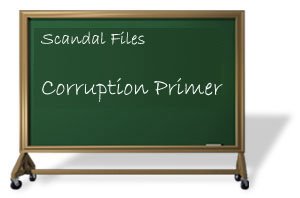 We’ve looked at how the individual crook can best avoid leaving a messy trail of evidence in the previous posting - Corruption Primer.
We’ve looked at how the individual crook can best avoid leaving a messy trail of evidence in the previous posting - Corruption Primer.Now let us turn our attention to the actual nuts and bolts of the commission of corrupt acts,
The methods are many and varied so we are concentrating on a specific example, the UN ‘Oil for Food’ scandal.
Charged with explaining how this specific set of practiced operates I found myself resorting to analogy to get the message across. That is to bring it down to a scale most potential crooks can comprehend.
School for Scandal
(note: This scenario is based on a North American school system. References might confuse Australians who should simply rely on their native abilities in the area of corruption.)
Our example involves a school district (lets call it Middle East District), which has decided to direct a government grant to supplying ‘humanitarian’ lunchboxes to its school children.
While the District will foot the bill, individual schools arrange their own purchases.
Irak Elementary School has signed up for the program and has been in talks with LunchBoxes Unlimited, a privatized spin-off consultancy from the Education Department staff.
Faced with a large number of proposals for supply, Irak Elementary happily settled on dealing with LunchBoxes Unlimited because the ‘big’ company was well organised and helped make decisions easy for the school administration.
Just to be certain though, LunchBoxes Unlimited worked a sweetener into the deal. They would give the school $1 back in cash for every individual lunch ordered. They could do this, they explained, by adding $1 per lunch to the bill they sent Middle East School District, who in turn had no qualms because it was government money, after all.
In fact, LunchBoxes Unlimited could raise the bill even higher, so long as they kept things within reasonable limits.
The Middle East Times and Gazette caught wind of some funny business going on with the school lunches and did a bit of investigative journalism. Well, in fact, they rewrote a ‘letter to the editor’ in which a local sandwich shop owner complained about the ‘dirty dealings’ and unfair treatment under the school lunch supply saga.
Tom’s Sandwiches had put in a good bid to supply lunches and obviously missed out. Nosing around, Tom found out how LunchBoxes Unlimited had won the deal.
The government was impressed with the school lunch plan, it was a good political winner for them, and so they weren’t all that interested in looking at complaints in local papers from irate sandwich shop owners.
Although there was a moment of confusion when the Minister seemed confused and kept referring to Irak as an online storage system.
In fact everyone was a winner in this deal. The district put a great program in place was delighted with the positive community response. Members were all assured of being returned next election.
Irak Elementary was happy on two fronts: The kids were assured of one decent meal a day and the school was getting extra funding from the contract. There were murmurs about the school acquiring weapons of mass instruction with the money, but nothing has been proved.
The Middle East Times and Gazette was happy because readership increased during the fuss caused by Tom’s Sandwiches.
Oh, Tom wasn’t happy, but then no one much liked him anyway.
 Now the story didn’t end there. No true corruption scandal is ever that simple. A school supply company, International Chalk comes into the picture here. International Chalk had supplied Irak Elementary wit a quantity of ‘all purpose’ chalk without going through the proper channels.
Now the story didn’t end there. No true corruption scandal is ever that simple. A school supply company, International Chalk comes into the picture here. International Chalk had supplied Irak Elementary wit a quantity of ‘all purpose’ chalk without going through the proper channels.Their salespeople new it was risky supplying before the proper purchase authority was made by the District. But they had a surplus stock at the time so they took the risk.
In the event, the District rejected the purchase and refused payment. The school had allocated all its own funds, so they couldn’t pay either.
It so happened that someone from Chalk International knew someone at LunchBoxes Unlimited and a deal was made whereby the latter would recover the money for a commission.
So LunchBoxes Unlimited tacked another dollar onto every lunchbox sold and the District paid for the chalk without even knowing it. Again, everyone was happy with this arrangement. LunchBoxes Unlimited ended up making even more money.
Well for a while at least, until Irak Elementary started complaining that the sandwiches were contaminated with peanut oil. They screamed about health hazards and threatened to stop taking delivery of boxed lunches.
Irak brought in a team of experts, well mothers really, who backed up the contamination claim. Faced with losing the contract over these false allegations LunchBoxes Unlimited did the only honorable thing – they offered the school $1.25 per box sold.
We will be back with more Corruption Primer soon.

1 comment:
very long post. Good, but longer than the blogger average.
Nice blog.
Post a Comment